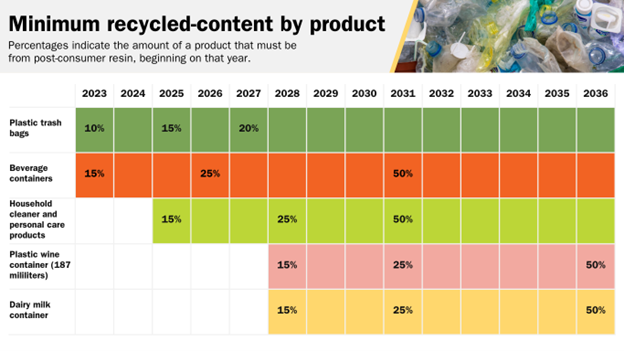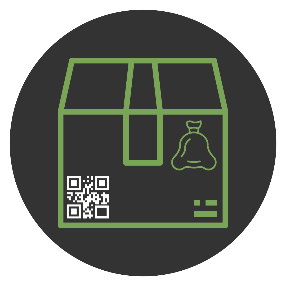Recycled content minimums
Washington state law requires producers of certain plastic products such as beverage containers, trash bags, and household and personal care product containers to meet post-consumer recycled content (PCRC) standards, register annually by April 1, and pay fees to support recycling and reduce landfill waste.
Producers must report the post-consumer recycled content (PCRC) used in their products from the previous year each year. Minimum PCRC requirements took effect for beverage containers and trash bags in 2023, with household cleaning and personal care products set to start in 2025. Beginning in 2029, minimum PCRC requirements will apply to dairy milk containers and small 187 ml wine bottles. Each product category is phased in according to a set schedule, with PCRC content thresholds that increase over time.
Minimum recycled content phases
Each product category will gradually increase PCRC requirements over the next fifteen years. By 2036, all packaging for covered products must contain at least 50 percent PCRC, except for trash bags, which will reach a minimum of 20 percent by 2027. These phased requirements strengthen recycling markets, support sustainable material use, and help producers meet evolving environmental standards.
Workload analysis
We annually publish a workload analysis (WLA) to calculate the estimated costs for administration and oversight of the post-consumer recycled content (PCRC) law in the coming year. You can review the WLA for fiscal year 2026, which runs from July 1, 2025 – June 30, 2026. Each year there is an opportunity for public comment on the WLA during the month of February.
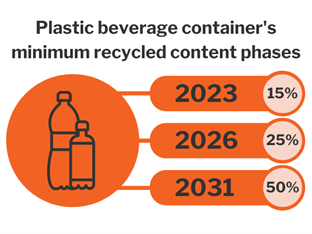
Plastic beverage containers
Beverage containers start at 15 percent in 2023 – move to 25 percent in 2026, and up to 50 percent in 2031.
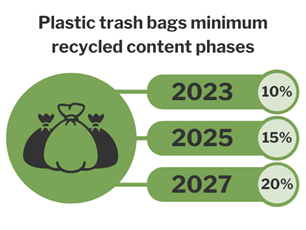
Plastic trash bags
Plastic trash bags start at 10 percent in 2023 – move to 15 percent in 2025 and 20 percent in 2027.
Trash bag labeling requirements started Jan. 1, 2023
Producers must label each package containing plastic trash bags sold or distributed in Washington with either:
- The name and location of the producer (city, state, and country)
OR
- A uniform resource locator (URL) or quick response code (QR code) to a website that contains this information
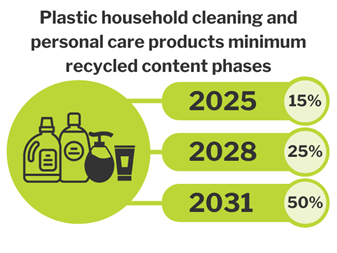
Plastic household cleaning & personal care products
Household cleaning and personal care products start at 15 percent in 2025 – move to 25 percent in 2028 and 50 percent in 2031.
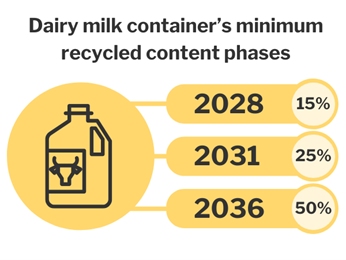
Plastic dairy milk containers
Plastic dairy milk containers start at 15 percent in 2028, 25 percent in 2031, and 50 percent in 2036.
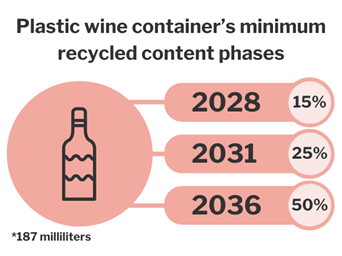
Plastic wine containers (187 milliliters)
Plastic wine containers (187 milliliters) start at 15 percent in 2028, 25 percent in 2031, and 50 percent in 2036.
Minimum content requirements drive demand for recyclable materials
For a thriving recycling system, buyers of recycled materials are essential. Minimum content requirements for recycled materials can create demand and support end markets. Both mechanical and chemical recycling methods are acceptable, but bio-resin is not a substitute for recycled content and does not count toward minimum requirements.
Annual reporting on recycled content requirements
Starting April 1, 2024, producers of beverage containers and trash bags must submit an annual report alongside their registration detailing the percentage of PCRC and the type of virgin plastic resin used in all covered products sold or distributed within Washington. As the phased targets take effect, product categories, such as household cleaning and personal care products, will be required to meet PCRC minimums and reporting requirements.
Requesting exclusions for federally regulated products
While most federally regulated products are required to meet PCRC requirements, certain federal packaging regulations may make including recycled content infeasible. Producers may request an exclusion for these products if they demonstrate that federal regulations prevent the use of PCRC. Exclusions are available only for dietary supplements and FDA-regulated drugs by default; however, other products may qualify if technical or regulatory barriers are proven.
Producers must request an exclusion through the Waste Reduction Portal by September 1 of the year before the exclusion period. Approved exclusions will apply to packaging produced the following year and reported the year after. All exclusion requests must be renewed annually, and sufficient documentation must validate the federal regulation constraints.
Apply for temporary exclusion
Apply for temporary exclusion within the Waste Reduction Portal via SecureAccess Washington.
Requesting adjustments to recycled content minimum requirements
Starting in 2024, Ecology may conduct an annual review to determine if the post-consumer PCRC minimums for specific containers, products, or product categories need adjustment for the following year. Producers seeking adjustments to the PCRC requirements should submit their requests at their annual registration, ideally before December 31, to allow adequate review time.
Adjustment requests must include comprehensive documentation to support the need for modification. This should consist of relevant data, a detailed explanation of any barriers to compliance, and proposed strategies for overcoming them. Valid reasons for requesting an adjustment may include:
- Shifts in market conditions, such as PCRC supply and demand, collection rates, or bale availability, both locally and globally
- Limited availability of recycled plastic suitable for PCRC requirements
- Insufficient recycling or processing infrastructure
- Technical limitations that prevent meeting PCRC minimums
- Product safety concerns related to PCRC usage
Producers are encouraged to apply as early as possible, as thorough review and justification are essential for Ecology to consider adjustments to PCRC requirements.
Contact information
Recycled content team
recycledcontent@ecy.wa.gov


